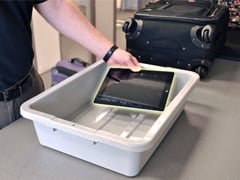Air cargo has always been a target for those wanting to cause harm to the transport industry. One of the ways they’ve done that is by concealing explosive devices into air freight on both cargo and passenger aircraft. Unfortunately, successful attempts have led to catastrophic consequences including severe damage to airline assets, disruption of the industry, and loss of life.
That’s why air cargo screening remains an imperative step in maintaining security. Without it, the industry would be incredibly vulnerable to explosive threats. Proper diligence must be exercised to protect the air cargo industry, the people working in it, and those utilizing its services.
Read More
Topics:
Aviation Security,
Cargo Security,
Security Threats,
Transportation
Mailroom screening is an important part of keeping your critical infrastructure facility secure. As an essential part of the community, you cannot afford to have any disruptions to your day to day operations.
Whether you are a bank, correctional facility, school, or courthouse, your mailroom is responsible for processing incoming and outgoing mail. Ensuring operations around this are kept safe is imperative. With a proactive approach, you’ll be prepared to protect your facility, staff, and assets in case of an attack.
Read More
Topics:
General Security,
Critical Infrastructure,
Security Threats,
Current Events
As specific airports facing the large PEDs ban implement stricter security controls, governments have been lifting restrictions on a case by case basis. The personal electronic device (PED) ban prohibits passengers from carrying large electronics such as tablets, eReaders, and laptops aboard certain aircrafts flying direct from one airport to another.
The main concern centers on select airports with insufficient security measures in place to prevent a new type of threat from entering secure areas. Threat PEDs cleverly use everyday consumer electronics to conceal improvised explosive devices (IEDs). The resulting product is items such as laptop bombs. Airports worldwide must reevaluate current security controls and if necessary, implement additional measures to effectively intercept threat PEDs at the checkpoint.
Read More
Topics:
Security Training,
Aviation Security,
Security Threats,
Current Events
Suicide bombings can occur anywhere. When we hear about them, they typically occur in North African countries or the Middle East region. One of the latest attacks occurred in Kabul, Afghanistan on the morning of May 31 in the city’s diplomatic quarters, killing at least 90 people and injuring more than 400.
At times, they occur in Asian or Western regions such as the attack in Manchester, UK which occurred shortly after a concert concluded on May 22, killing 22 and injuring dozens. In another incident just two days later, a pair of suicide bombers killed three police officers outside a bus terminal in Jakarta, Indonesia.
No one can tell where and when a suicide bomber will strike. That’s why incidents like these are such a shock and difficult to cope with. It does not matter where in the world you are, it’s clear that the threat of the suicide bomber has grown greater and become more widespread.
Read More
Topics:
Trends,
General Security,
Critical Infrastructure,
Security Threats,
Current Events
For years terrorists have called on followers, affiliates, and sympathizers to use any means necessary to harm those who do not follow their ideals. For those who are unable to build their own bombs or acquire the necessary weapons to carry out attacks, the use of vehicles has been recommended to cause damage and harm people.
We’ve seen it time and time again. Terrorists and lone wolfs drive trucks, lorries, and other vehicles through large crowds, injuring and killing the defenseless. It’s an ugly terrorism tactic that has gained momentum in the past few years. Even in just the last few months, we’ve witnessed a handful of these vehicle attacks worldwide. Let’s look back at the most recent incidents and discuss this new terrorism trend of using vehicles as a weapon.
Read More
Topics:
Trends,
General Security,
Critical Infrastructure,
Security Threats,
Current Events
On the morning of Tuesday 21 March, the United States announced an electronics ban on inbound direct flights from certain Middle East and North African countries and required nine airlines to comply within 96 hours. The United Kingdom released similar restrictions later that day affecting 14 airlines.
Both bans order airlines to prohibit passengers from bringing large electronics into the cabin of the aircraft, but to instead place them into checked baggage. Although there is no direct threat or plot authorities are aware of, US officials say it’s a move in response to terrorist organizations working to perfect techniques for hiding explosives in electronic devices. Let’s take a closer look into the aviation threat causing governments to implement bans.
Read More
Topics:
Aviation Security,
Cargo Security,
Security Threats,
Transportation,
Current Events
Released November 2016, the fourth edition of the Global Terrorism Index (GTI) generated by the Institute for Economics & Peace (IEP) continues to analyze key global terrorism trends and patterns for 163 countries. Raw data is derived from the Global Terrorism Database which is considered to be the most comprehensive dataset on terrorist activity, with over 150,000 terrorist incidents documented worldwide.
This most recent edition of the terrorism index puts an emphasis on a 16-year time frame beginning in 2000 through the end of 2015. As defined by the GTI, terrorism is “the threatened or actual use of illegal force and violence by a non-state actor to attain a political, economic, religious, or social goal through fear, coercion, or intimidation.” Here’s a summary of the latest global terrorism trends, facts, and figures.
Read More
Topics:
Aviation Security,
Trends,
General Security,
Cargo Security,
Security Threats
One of the primary weapons of choice for terrorists and lone wolf attackers has been the Improvised Explosive Device, or IED. These dangerous, homemade devices are typically constructed from common household items making them rather inexpensive to build. Nevertheless, IEDs can pack a powerful punch and have been known to cause an extraordinary amount of damage and loss of life.
Consequently, security checkpoint personnel must always be on high alert for the IED threat. If allowed to pass through a checkpoint, the device will certainly be used with malicious intent. At a fundamental core, security personnel must gain a basic understanding of improvised explosive devices and how they are constructed in order to recognize when one is presented before them.
Read More
Topics:
Aviation Security,
General Security,
Cargo Security,
Ports & Borders,
Critical Infrastructure,
Security Threats,
Transportation
If it seems as though terrorism has been on the rise these past few years, it has. Terror attacks have spread to more countries than ever and innocent, private citizens are increasingly becoming targets. When terrorism strikes, it undeniably leaves a lasting impact on the nation and its people.
In the third edition of the Global Terrorism Index for 2015, the Institute for Economics and Peace (IEP) collected data from the Global Terrorism Database to determine key global trends and patterns in terrorism over the past 15 years, with an emphasis on 2014. Let’s take a look at these global terrorism trends, facts, and figures.
Read More
Topics:
Aviation Security,
Trends,
General Security,
Cargo Security,
Security Threats
Aviation is an extraordinary industry powered by the cooperation of countless companies and people. Many of these same people aspire to keep air transport safe and running smoothly.
Unfortunately though, aviation has always been a target for those wanting to bring attention to their own cause by carrying out harm to the industry. It’s only a matter of time before the next attack or attempt occurs. That’s why the aviation industry must always be vigilant of the following threats.
Read More
Topics:
Aviation Security,
Trends,
Security Threats,
Transportation










